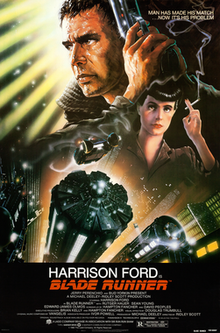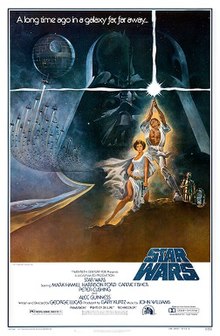If you don’t know who Harrison Ford is, then you’ve likely never seen any number of successful or timeless classics. While Ford has been in many thrillers and dramas, including Best Picture nominees American Graffiti (1973), The Conversation (1974), Apocalypse Now! (1979), Witness (1985) (wherein he obtained his one and only Best Actor Oscar nomination), and The Fugitive (1993), he is perhaps best known for his leading roles in such franchises as Star Wars and Indiana Jones (both of which also obtained Best Picture nominations over the years). He’s so recognizable that it’s sometimes shocking to find his appearance altered in movies like 42 (2013), only to eventually recognize that trademark smirk and gravelly voice and know it’s really Harrison Ford. This week’s two films highlight some of the best roles of Harrison Ford.
Blade Runner
Year: 1982
Rating: R
Length: 117 minutes / 1.95 hours
The sci-fi genre has been kind to Harrison Ford, offering him many memorable roles throughout the years. Not only has Han Solo from Star Wars: A New Hope (1977) been placed as #14 on the American Film Institute’s list of Top 50 heroes, but the role has been repeated by Ford in the sequels, The Empire Strikes Back (1980), Return of the Jedi (1983), and The Force Awakens (2015). While Han Solo is certainly iconic, Ford doesn’t bring him into his other roles, like Colonel Hyrum Graff in Ender’s Game (2013), thus showing he has a certain amount of range when it comes to his sci-fi characters. Of course, some of this is dictated by the movie itself. The cyberpunk-inspired Blade Runner (1982), and its sequel, Blade Runner 2049 (2017), have a darker tone than his other sci-fi roles, and he adapts the character of Rick Deckard to fit the theme.
Rick Deckard (Harrison Ford) is put on task as a Blade Runner to track down four androids who have recently arrived on Earth. Androids aren’t allowed on Earth, having been relegated to the outer worlds of the human empire, so their presence in Los Angeles is illegal. While most androids can be identified via an “emotion test” known as the “Voight-Kampff,” some of these newer models have figured out how to outsmart it. With this added challenge, Rick manages to find these androids as they search for their “maker,” Tyrell Corporation founder Eldon Tyrell (Joe Turkel). Along the way, Rick learns from the androids’ leader, Roy Batty (Rutger Hauer), that they want to live longer than the four-year lifespan the androids have been given. As sentience and humanity become increasingly ambiguous, Rick continues to fulfill his duties as a Blade Runner and eliminate the android threats.
Raiders of the Lost Ark
Year: 1981
Rating: PG
Length: 115 minutes / 1.92 hours
George Lucas really liked working with Harrison Ford. Not only was he cast in Star Wars, but he was also included in Lucas’ breakout film, American Graffiti (1973). Obviously, Ford made an impression, because he was eventually given the titular role of Indiana Jones in Raiders of the Lost Ark (1981). A role he went on to repeat in Indiana Jones and the Temple of Doom (1984), Indiana Jones and the Last Crusade (1989), and Indiana Jones and the Kingdom of the Crystal Skull (2008). It’s no wonder that Indiana Jones was placed at #2 on the American Film Institute’s list of Top 50 heroes, only bested by Gregory Peck’s Atticus Finch from To Kill a Mockingbird (1962). Time will tell if the fifth installment in the Indiana Jones franchise will recreate the magic of the original Raiders of the Lost Ark, but it hopefully isn’t as bad as Crystal Skull, which almost feels serious next to the camp of Cowboys & Aliens (2011).
After a failed expedition in Peru, Indiana Jones (Harrison Ford) returns to his academic job at Marshall College where he teaches archaeology. Following one of his lectures, two men from Army Intelligence approach Dr. Jones and inform him of a plot by the Nazis to obtain the fabled Ark of the Covenant. They want him to go to Egypt to try and find this artifact before the enemy does. After a short stop in Nepal to recover a piece of the Staff of Ra, Jones makes his way to Egypt and uses his archeological knowledge to find the Ark amongst a Nazi excavation site. Unfortunately, the Nazis intercept Jones and take the Ark away, leaving him in a pit of snakes. Using some ingenuity, Jones escapes and intercepts the Nazis again, but fails to stop them from testing the artifact. Fortunately, the power of the Ark is too much for the Nazis to handle and Jones manages to safely return it to the United States.
2 sum it up: 2 films, 2 fantastic Harrison Ford roles
Bacon #: 2 (Apocalypse Now! / Robert Duvall -> Jayne Mansfield’s Car / Kevin Bacon)

